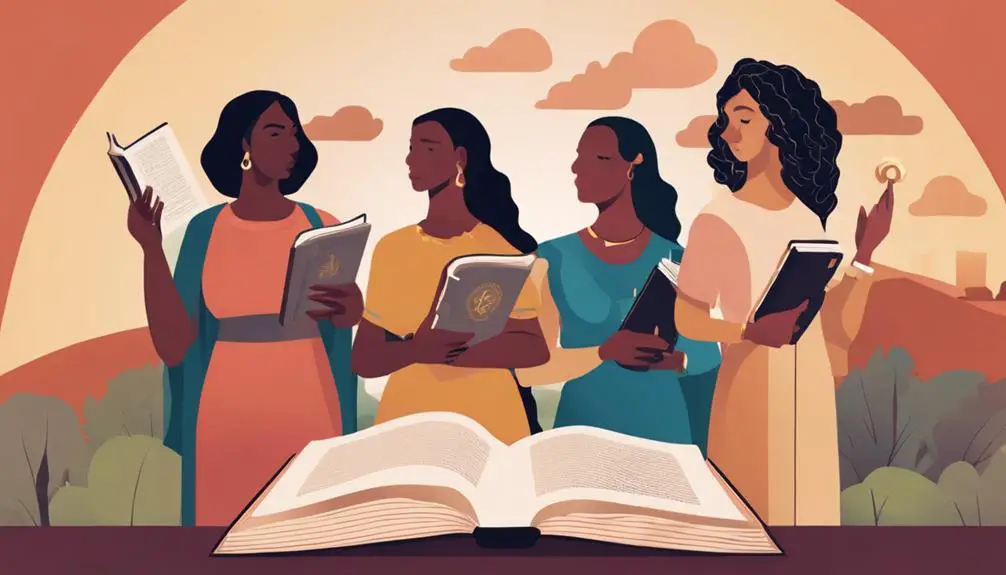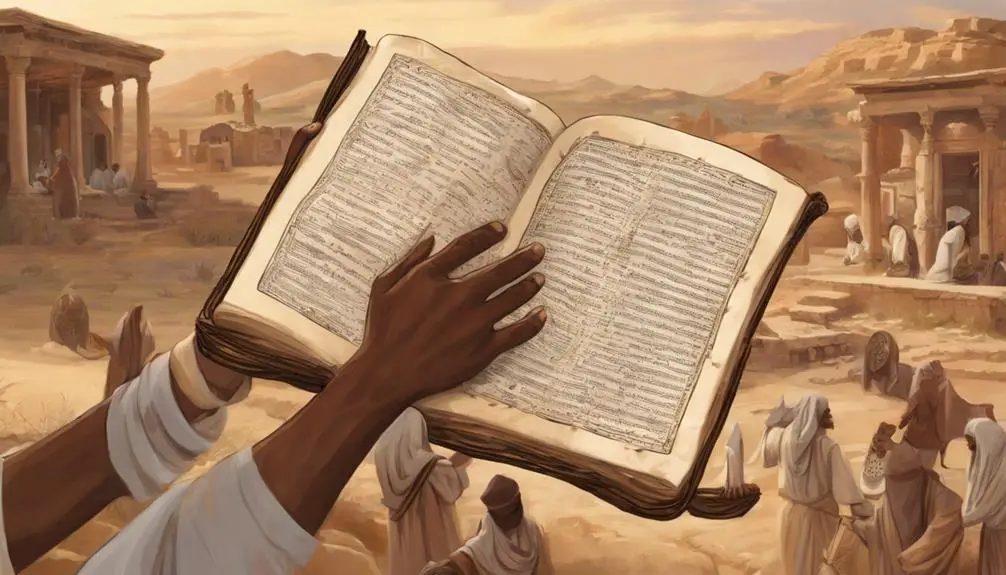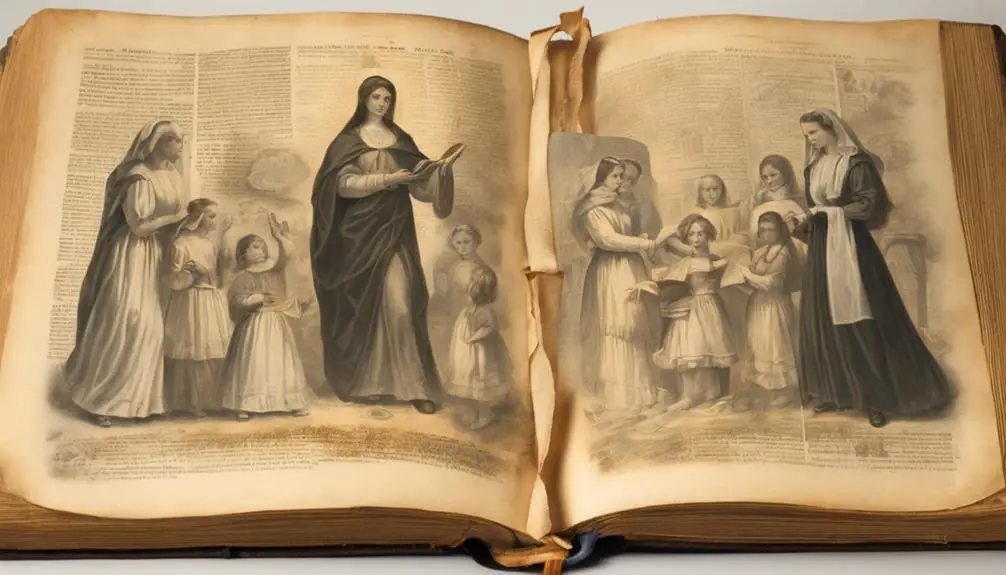Find out how well you know the mothers of the Bible with our enlightening quiz; you might just learn something new!

Mothers in the Bible Quiz
Did you know that there are over 50 mothers mentioned in the Bible, each with their own unique story and lessons to share? Test your knowledge with this enlightening quiz about these biblical matriarchs.
From Eve, the mother of all living, to Mary, mother of Jesus, their stories not only provide historical context but also offer timeless wisdom.
So, are you ready to test your biblical knowledge and maybe learn something new along the way?
Key Takeaways
- The quizzes test knowledge of mothers in both Old and New Testaments, highlighting their influence and lessons learned.
- Diverse motherhood experiences, from Sarah's patience to Mary's obedience, are explored and analyzed.
- The quizzes offer a chance to understand the matriarchal influence in biblical history and teachings.
- Reflection on quiz results can enhance comprehension of biblical stories and facilitate personal self-reflection.
Exploring Biblical Matriarchs

In delving into the realm of biblical matriarchs, you'll discover an array of strong, influential women who played pivotal roles in the stories and teachings of the Bible. Their matriarchal influence can't be understated; it shaped the course of biblical history, playing a key role in the preservation and proliferation of the faith.
Biblical motherhood, as portrayed through these matriarchs, defies the narrow confines of conventional maternal roles. It isn't merely about birthing and nurturing children, but also about leadership, courage, wisdom, resilience, and faith. Women like Sarah, Rebekah, Leah, and Rachel, despite their struggles and flaws, stood as pillars of strength and sources of wisdom.
These matriarchs, through their actions and decisions, shaped the destiny of nations. Their influence reached beyond their family units, affecting the social, political, and spiritual dynamics of their societies. For instance, Sarah's insistence on Isaac's sole inheritance directly influenced the formation of the Israelite nation.
In essence, the biblical matriarchs serve as profound examples of strength, endurance, and faith, producing a lasting matriarchal influence that transcends generations. Their stories remain embedded within the tapestry of biblical narratives, serving as timeless lessons of faith and resilience.
Quiz: Mothers of the Old Testament

Ready to test your knowledge on the mothers of the Old Testament? Let's dive into a world marked by matriarchal influence and Old Testament parenthood in a quiz format. The Old Testament is replete with powerful women who are the bedrock of their families and societies. These mothers, with their wisdom, courage, and resilience, offer invaluable lessons.
In this quiz, you'll be asked about the lives and legacies of these matriarchs. You'll revisit the tales of Sarah, Rebecca, Rachel, and Leah, among others. You'll explore how their decisions and actions shaped the course of their children's lives and, in turn, the history of the Israelites. You'll also study their unique parenting styles and how they navigated the challenges of Old Testament parenthood.
We'll probe into the circumstances and actions that highlight their matriarchal influence. For instance, how did Sarah's faith influence Abraham and Isaac? How did Leah's endurance shape Judah's character? What lessons can be learnt from Rachel's persistence and Rebecca's strategic thinking?
Get ready to delve into the complexities and intricacies of these biblical mothers, their influence, and their legacy. The answers might surprise you.
Quiz: Mothers of the New Testament

Let's switch gears and dive into the lives of the mothers from the New Testament, where you'll encounter mothers like Mary, Elizabeth, and others who played pivotal roles in the unfolding narrative of Christianity. The Virgin Mary's influence is immeasurable, her faith and obedience acting as a beacon throughout history. Mary, selected by God to conceive Jesus Christ, stands as the epitome of humble acceptance and unwavering faith, making her a compelling figure to study and understand.
Then there's Elizabeth, the mother of John the Baptist, who despite her advanced age, gave birth to a son who'd pave the way for Jesus. Her story is a testament to the power of faith and God's ability to work miracles.
Not forgetting Paul's female mentors, like Priscilla and Phoebe, these women played instrumental roles in Paul's ministry, providing guidance, support, and exhibiting strength in the face of adversity. Priscilla, along with her husband Aquila, instructed Apollos, an eloquent speaker, in the way of God more accurately.
Understanding these mothers' experiences, their struggles, and their triumphs, provides you with a richer perspective on the New Testament and its teachings.
Notable Lessons From Biblical Mothers

Drawing lessons from the lives of biblical mothers can provide valuable insights into faith, resilience, and obedience, shaping our understanding of these figures and their role in the Christian narrative. Biblical mothers exerted a significant matriarchal influence, often acting as pillars of faith and resilience in times of hardship and trials.
Here are four lessons we can glean from their lives:
- Sarah, the mother of nations, teaches us patience in waiting for God's promises.
- The Canaanite woman's persistent faith demonstrates the power of relentless trust in God.
- Naomi's story reveals the beauty of redemption, even in the face of loss.
- Mary's divine motherhood shows us the ultimate example of obedience and submission to God's will.
In these accounts, you'll find a common thread: these mothers exhibited remarkable faith and obedience, even when faced with unimaginable circumstances. They were far from perfect, but their stories serve as a testament to the transformative power of faith and the matriarchal influence. As you delve deeper into their stories, you'll find rich lessons that still hold relevance in our lives today.
Quiz Results and Reflections

Having explored the lessons from the lives of biblical mothers, it's crucial now to reflect on your understanding through the lens of the recently completed quiz. Your Quiz Analysis process should include reviewing both your correct and incorrect answers. Assess the reasons behind your mistakes and understand the knowledge gaps. This will not only enhance your biblical comprehension but will also aid in self-reflection, revealing your Personal Insights.
The table below summarises the quiz sections, average scores, and common areas of difficulty:
Quiz Section |
Average Score |
Common Difficulties |
|---|---|---|
Sarah's Faith |
80% |
Understanding her patience |
Hagar's Courage |
75% |
Interpreting her perseverance |
Rebekah's Deception |
65% |
Grasping the motives behind her actions |
Mary's Devotion |
85% |
Comprehending her unconditional love |
These reflections serve as a mirror, highlighting your strengths and identifying areas for improvement. They provide an opportunity for growth, enabling you to delve deeper into the complex narratives of these biblical mothers. Remember, the aim of this exercise is not just to accumulate information, but to foster a greater understanding and appreciation of the lessons they impart.
Frequently Asked Questions
What Are Some Resources to Further Study the Role of Mothers in the Bible Outside This Article?"
You might consider exploring resources like books on Biblical Motherhood Symbolism or scholarly articles on Mother-child Relationships in the Bible.
Websites offering Bible studies can provide in-depth analysis. Documentaries focusing on Biblical times also hold valuable insights.
Remember, many theological schools offer courses on Bible studies, and local libraries often have sections dedicated to religious studies.
Don't forget, consulting with religious leaders can also enrich your understanding.
Is There a Significance to the Order in Which the Mothers Appear in the Bible?"
Yes, there's significance to the order in which mothers appear in the Bible. It's not random. Each mother's symbolism and role in divine motherhood unfolds in a chronological narrative.
As you study, you'll notice patterns and themes that reflect the broader context of God's story. Remember, each of these women contributed to the lineage of faith, providing valuable insights into God's plan and purpose.
How Did the Societal Role of Mothers During Biblical Times Influence the Depiction of Mothers in the Bible?"
You're looking at how societal roles of mothers during biblical times influenced their depiction in the Bible.
Biblical matriarchies and maternal symbolism played a significant role. Mothers often symbolize nurturing and care.
Their societal roles, such as being providers and caregivers, influenced their biblical portrayals, emphasizing their strength, wisdom, and influence.
Their narratives show us how their societal expectations shaped their biblical roles and significance.
Are There Any Controversial Interpretations of the Role of Mothers in the Bible?"
Yes, there are indeed controversial interpretations of the role of mothers in the Bible. Some scholars focus on maternal symbolism and the figurative role of biblical matriarchs, which can lead to differing interpretations.
Others argue that these matriarchs were depicted in a way that reinforced societal norms of the time, rather than challenging them.
It's important to remember these are interpretations and not definitive truths.
What Is the Historical Accuracy of the Depiction of Motherhood in the Bible?"
You're examining the historical accuracy of the depiction of Biblical motherhood. It's not a simple task. While maternal symbolism abounds, concrete details can be sparse. Mothers in the Bible often represent ideals rather than individuals. Given this, it's hard to gauge historical accuracy.
The Bible's portrayal is more about the roles and values of motherhood rather than a factual representation. So, you're left interpreting symbolism and metaphor, rather than analyzing historical fact.
Conclusion
In wrapping up, your understanding of Biblical mothers' roles and their significant lessons has been tested and enriched. These quizzes offer a deeper dive into both Old and New Testament matriarchs, opening insights into their strengths, challenges, and faith.
Reflect on your results, appreciate the dimensions they add to your faith journey, and continue delving into these profound narratives. Remember, every Bible study is a step towards greater spiritual growth and wisdom.



Sign up